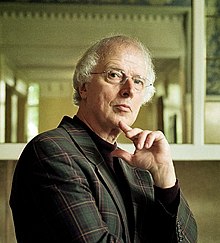Die wundersame Schustersfrau
| Die wundersame Schustersfrau | |
|---|---|
| Opera by Udo Zimmermann | |
 The composer | |
| Translation | The Wondrous Cobbler's Wife |
| Librettist |
|
| Language | German |
| Based on | Lorca's La zapatera prodigiosa |
| Premiere | 25 April 1982 |
Die wundersame Schustersfrau (The Wondrous Cobbler's Wife) is an opera in two acts by Udo Zimmermann, with a libretto which he wrote with Eberhard Schmidt based on the 1930 Spanish play La zapatera prodigiosa, a farsa violenta by Federico García Lorca, in the translation by Enrique Beck. The opera was first performed on 25 April 1982 at the Schlosstheater Schwetzingen, staged by Alfred Kirchner.
History
[edit]Die wundersame Schustersfrau is Zimmermann's fifth opera and the first not premiered in the GDR.[1] He wrote it on a commission by the broadcaster Süddeutscher Rundfunk after the success of his opera Der Schuhu und die fliegende Prinzessin at the 1977 Schwetzingen Festival. The libretto, based on Enrique Beck's German version of Lorca's La zapatera prodigiosa, was written by the composer and Lutz Eberhard Schmidt. Zimmermann completed the composition in 1981.[2][3]

The premiere, as part of the Schwetzingen Festival at the Schlosstheater Schwetzingen on 25 April 1982, was produced by the Hamburg State Opera, conducted by Peter Gülke and staged by Alfred Kirchner.[1][2] During the same season, the opera was performed in Karlsruhe, Bielefeld and the Leipzig Opera,[2] the first performance in the GDR.[4]
The stage director Michael Heinicke wrote a version suitable for small stages in 1985, which was performed in Bautzen, Meiningen, at the Staatstheater Nürnberg, and in 1988 at the first Munich Biennale.[5] It was performed in Bonn in 1989 (conducted by the composer), Regensburg in 1992, Klagenfurt in 1993, and at the Deutsche Oper am Rhein in Duisburg in 1996.[2][6][7]: 571 [8]
Roles
[edit]| Role | Voice type | Premiere cast, 25 April 1982 Conductor: Peter Gülke[1] |
|---|---|---|
| Schustersfrau | soprano | Lisbeth Balslev |
| Schuster | baritone or bass-baritone | Franz Grundheber |
| Gelbe Nachbarin | soprano | Hildegard Uhrmacher |
| Grüne Nachbarin | soprano | Yoko Kawahara |
| Violette Nachbarin | mezzo-soprano | Gertrud Ottenthal |
| Rote Nachbarin | contralto | Olive Fredericks |
| Schwarze Nachbarin | contralto | Ursula Boese |
| Two daughters of the Rote Nachbarin | soprano | |
| Küstersfrau | mezzo-soprano | |
| Bürgermeister | bass | Ude Krekow |
| Don Amsel | tenor | |
| Bursche mit der Schärpe | tenor | |
| Bursche mit dem Hut | baritone | |
| Knabe | mezzo-soprano, composed speaking role |
Music
[edit]A critic of the premiere noted the opera's expressivity, beginning with a beginning of one central tone, intensified in rhythm and dynamics, a "chiffre" repeated in emotional situations. Other elements are fake-folklore, use of the celesta reminiscent of Mozart, and repeated strong beats marking rage. Zimmermann wrote complex ensembles in octets of women.[1]
Recording
[edit]Excerpts from Act 2 were recorded as part of the series Musik in Deutschland 1950–2000 under the title Nach- und Nachtgesänge – Oper 1977–1987 – Werke von Kirchner, U. Zimmermann, Matthus, W. Zimmermann, Rihm. As in the premiere, Peter Gülke conducted the Philharmonisches Staatsorchester Hamburg.[9][10]
References
[edit]- ^ a b c d Herbort, Heinz Josef (30 April 1982). "Leben mit dieser Welt / Die eine und die andere Neue Musik: Udo Zimmermanns Lorca-Oper 'Die wundersame Schustersfrau' in Schwetzingen und Kammermusik in Witten". Die Zeit (in German).
- ^ a b c d Thomas Gartmann: Die wundersame Schustersfrau. In Pipers Enzyklopädie des Musiktheaters, Vol. 6: Werke. Spontini – Zumsteeg. Piper, Munich/Zürich 1997, ISBN 3-492-02421-1, p. 809–811.
- ^ Ulrich Schreiber: Opernführer für Fortgeschrittene. Das 20. Jahrhundert II. Deutsche und italienische Oper nach 1945, Frankreich, Großbritannien. Bärenreiter, Kassel 2005, ISBN 3-7618-1437-2, pp. 170–172.
- ^ Kraus, Michael (2017). Die musikalische Moderne an den Staatsopern von Berlin und Wien 1945–1989: Paradigmen nationaler Kulturidentitäten im Kalten Krieg (in German). Springer Verlag. pp. 190–193. ISBN 978-3-47-604353-5.
- ^ Udo Zimmermann: Gespräch mit Fritz Hennenberg. In Mathias Hansen (ed.): Komponieren zur Zeit. Gespräche mit Komponisten der DDR. Leipzig 1988, pp. 331–333. Cited from Neef, pp. 568–571.
- ^ Die wundersame Schustersfrau. In: Harenberg Opernführer. 4th edition. Meyers Lexikonverlag, 2003, ISBN 3-411-76107-5, p. 1092–1093.
- ^ Sigrid Neef: Die wundersame Schustersfrau. In Deutsche Oper im 20. Jahrhundert – DDR 1949–1989. Lang, Berlin 1992, ISBN 3-86032-011-4, pp. 564–573.
- ^ Imre Fabian: Lehrfabel von der menschlichen Seele. In: Programmheft der Oper Duisburg, 1995.
- ^ OCLC 725307996
- ^ Literature about Die wundersame Schustersfrau in the German National Library catalogue.
External links
[edit]- Die wundersame Schustersfrau (synopsis) opera-guide.ch
- The Wondrous Cobbler's Wife Breitkopf & Härtel
- Manfred Rückert: Die wundersame Schustersfrau (detailed synopsis) tamino-klassikforum
